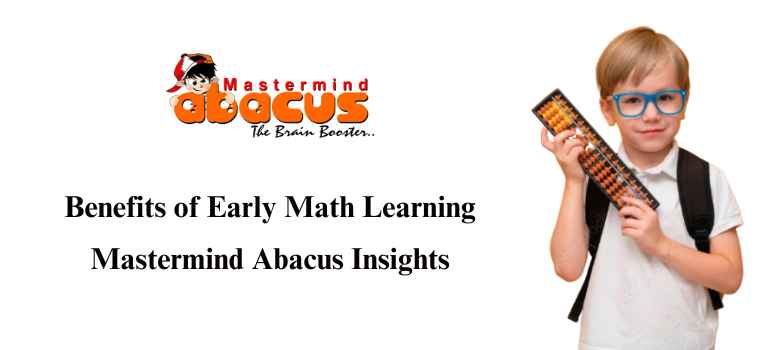
Benefits of Early Math Learning | Mastermind Abacus Insights
Introduction
As parents, we constantly seek ways to support our children’s development, ensuring they are well-prepared for future challenges. One of the most effective ways to boost a child's cognitive skills is through early exposure to math. Teaching math at an early age goes beyond just learning numbers; it plays a significant role in shaping young minds, enhancing their cognitive abilities, and preparing them for a successful academic journey. In this blog, we will explore seven incredible cognitive benefits of teaching math to young children, along with practical tips for parents to incorporate math learning into everyday life.
1. Improves Memory and ConcentrationOne of the primary cognitive benefits of early math learning is improved memory and concentration. Engaging with numbers, patterns, and sequences requires children to focus and recall information, thereby enhancing their memory retention. For example, when children practice simple addition and subtraction using an abacus, they must remember previous calculations and pay attention to the placement of beads, which helps improve their concentration.
Story Highlight: Consider the case of a six-year-old named Mia, who struggled with focusing on her schoolwork. After enrolling in abacus classes, her parents noticed a remarkable improvement in her ability to concentrate. The structured learning environment and repetitive practice of math problems using the abacus helped Mia develop a stronger attention span, which also positively impacted her performance in other subjects.
Tip for Parents:Encourage your child to solve simple math problems or play memory-based math games to enhance their memory and concentration skills. You can use tools like flashcards or abacus to make learning fun and interactive.
2. Enhances Problem-Solving Skills
Math is inherently about solving problems, which is why introducing math concepts early on can significantly enhance a child's problem-solving abilities. When children learn to break down complex problems into smaller, manageable steps, they develop critical thinking skills that are useful beyond the classroom.
Engaging Visuals: Include a simple infographic that illustrates the steps in solving a math problem, such as breaking down a word problem into actionable steps. This visual representation can help parents understand how to guide their children through the problem-solving process.
Tip for Parents: Encourage your child to solve puzzles and play strategy games like chess or Sudoku, which require logical thinking and problem-solving. This practice will not only make math more engaging but also improve their cognitive abilities.
3. Boosts Logical and Analytical Thinking
Early math education introduces children to logical reasoning and analytical thinking. When children learn to recognize patterns, classify objects, and understand relationships between numbers, they develop a logical approach to thinking. This skill is crucial in various aspects of life, from making everyday decisions to tackling more complex challenges in the future.
Story Highlight: Seven-year-old Arjun, for example, showed significant improvement in his analytical thinking after starting abacus classes. He began to approach everyday situations—like deciding the quickest route to school or sorting his toys by color and size—with a more logical and systematic mindset.
Tip for Parents: Engage your child in activities that require pattern recognition, such as sorting objects or playing with building blocks. These activities promote logical thinking and help them understand the basics of categorization and sequencing.
4. Fosters Mathematical Fluency
Mathematical fluency the ability to understand numbers and solve problems quickly and accurately—is a vital cognitive skill developed through early math learning. Using tools like the abacus helps children visualize numbers and calculations, making abstract concepts more concrete and understandable. This fluency forms the foundation for more advanced mathematical learning in later years.
Subtle Promotion: Mastermind Abacus offers interactive online classes that teach children mathematical fluency in a fun and engaging way. Through structured lessons and interactive sessions, children learn to handle numbers with ease, building a strong foundation for future learning. To learn more about our unique approach to math education, visit Mastermind Abacus Online Classes.
Tip for Parents: Practice counting with your child in everyday scenarios, like counting steps, groceries, or toys. This practice will help them become comfortable with numbers and develop fluency over time.
5. Encourages Creativity and Imagination
Contrary to popular belief, math is not just about numbers and formulas; it also encourages creativity and imagination. When children are introduced to math early, they learn to think outside the box and find creative solutions to problems. This creative approach to problem-solving is valuable in all areas of life, from academics to personal endeavors.
Engaging Visuals: Include a short video demonstrating a creative math game or activity that parents can try with their children at home. This visual content will make the blog more interactive and provide parents with actionable ideas.
Tip for Parents: Introduce math-related stories or riddles that encourage imaginative thinking. Create fun scenarios where math is needed to solve a problem, like a treasure hunt where each clue involves a simple math problem.
6. Develops Spatial Awareness and Visualization Skills
Learning math early helps children develop spatial awareness and visualization skills, which are crucial for understanding geometry, engineering, and even everyday tasks like navigation. Activities such as using an abacus or playing with geometric shapes can help children visualize spatial relationships and improve their spatial reasoning skills.
Story Highlight: A young student named Lily initially had difficulty understanding spatial concepts, but after engaging with an abacus, she began to visualize numbers and their relationships better. This newfound spatial awareness also helped her excel in other subjects, like art and science, where visualization is key.
Tip for Parents: Encourage your child to play with building blocks, puzzles, and shapes. These activities enhance spatial reasoning and visualization skills, making them more comfortable with complex concepts later on.
7. Builds Confidence and Reduces Math Anxiety
Early exposure to math helps build a child's confidence and reduces anxiety related to math learning. When children learn math in a supportive and interactive environment, they are less likely to develop math-related fears and more likely to approach the subject with confidence and curiosity.
Subtle Promotion: Mastermind Abacus’s online classes are designed to create a positive and supportive learning environment where children feel comfortable exploring math concepts. Our expert instructors use engaging methods to make math fun, reducing anxiety and building confidence in young learners. Discover more about our approach at Mastermind Abacus Online Classes.
Tip for Parents: Praise your child for their efforts in learning math, even if they make mistakes. Positive reinforcement helps build confidence and encourages a growth mindset.
Conclusion
Teaching math to young children is more than just preparing them for school; it’s about equipping them with essential cognitive skills that will benefit them throughout their lives. From improving memory and concentration to fostering creativity and confidence, early math education offers a wealth of benefits that go beyond numbers. By incorporating simple math activities into everyday life, parents can help their children develop a love for learning and set them on a path to success.
For parents looking for a structured and engaging way to introduce their children to the world of math, consider exploring the interactive online classes offered by Mastermind Abacus. Our programs are designed to make learning math a fun and rewarding experience for young minds.
Encourage your child to embrace the joy of math today and watch them thrive cognitively and academically!





.png)